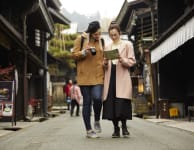Soaking in an onsen is a time-honored experience you won’t want to miss when in Japan. This guide will help you step confidently into the water and embrace the timeless art of onsen bathing.
If you spend even a few minutes browsing online content about Japan, you’re sure to come across an image of an inviting hinoki-wood or stone onsen (hot spring) bath, steam rising gently from the water’s surface. In such images, onsen bathing appears to be serene, but onsen culture can be a little daunting for first-time visitors—as it is for some Japanese people too!
What Is an Onsen?
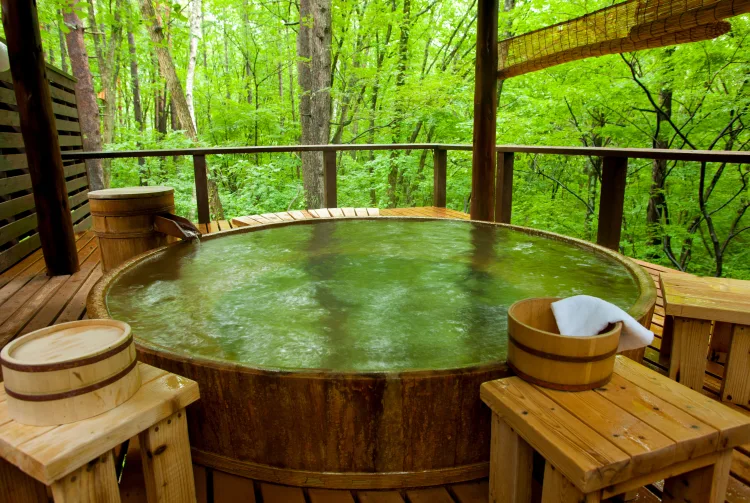
Onsen offer the rare chance to bathe in nature’s warmth, surrounded by quintessential Japanese scenery.
Heated geothermally, onsen can be found all across Japan, thanks to the country’s location along the Pacific Ring of Fire. The texture and mineral content of onsen water vary by region, making each onsen’s water distinct—from cloudy and milky to smooth and effervescent—which only adds to the pleasure of bathing in it.
What Are the Benefits of an Onsen?
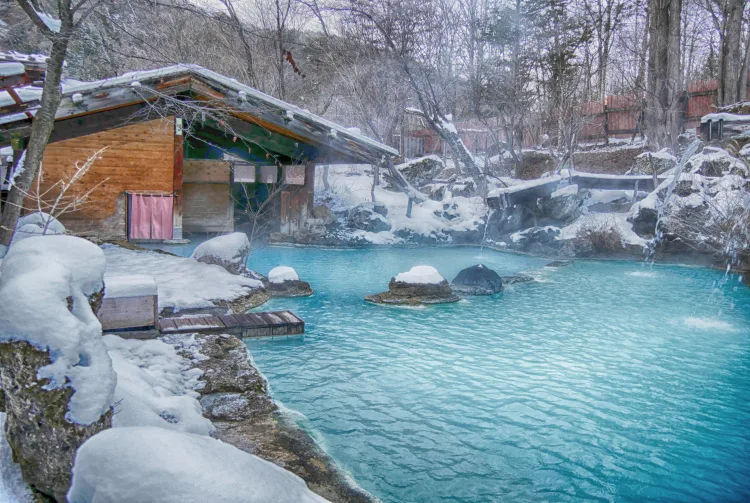
Many onsen facilities boast beautiful seasonal views throughout the year—the perfect backdrop to a relaxing dip.
Onsen bathing is touted as a mentally and physically beneficial experience—and for good reason. The mineral-rich waters have been known to ease muscle stiffness, soothe pain, and lower blood pressure, while also boosting circulation and leaving skin silky smooth. Yet, the magic isn’t just in the water. Onsen facilities—often designed to incorporate natural materials and peaceful settings like traditional gardens, mountain views, and snow-draped rockeries—offer one-of-a-kind relaxation as you disconnect from the outside world and reconnect with yourself.
How to Bathe at an Onsen
Bathing at an onsen isn’t all that tricky, as long as you remember a few important points.
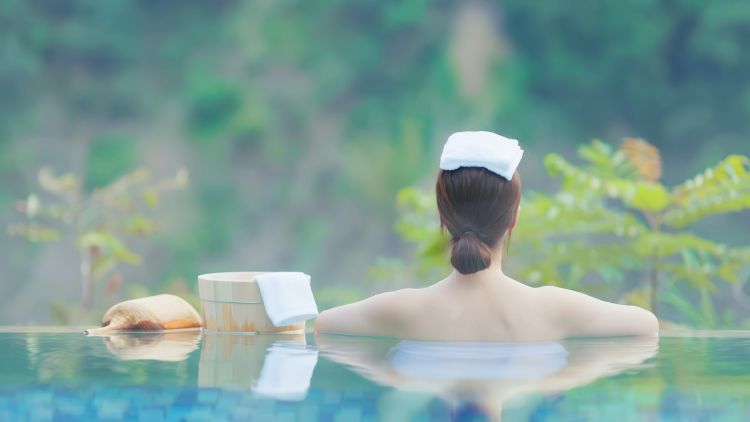
Place your small towel on your head as you enter the bath—a classic move among seasoned onsen-goers in Japan.
1. Undress completely in the changing area.
Onsen bathing is typically enjoyed in the nude, so clothing (including swimwear) should be left in the changing area. While you might feel a little awkward at first, public bathing is completely normal in Japan, and people tend to be discreet and respectful of each other’s space. For modesty, you may cover yourself with a small towel (usually provided) while you walk to the bath (just don’t take it into the water—more on that next!)
2. Keep towels and hair out of the water.
That small towel is for washing yourself or covering yourself for modesty before entering the bath—it’s not for use in the bath. Fold it and place it on your head or on the side of the bath before getting into the water. Also be sure to tie up long hair or wrap it in a towel. Onsen water is meant to stay clean and pure.
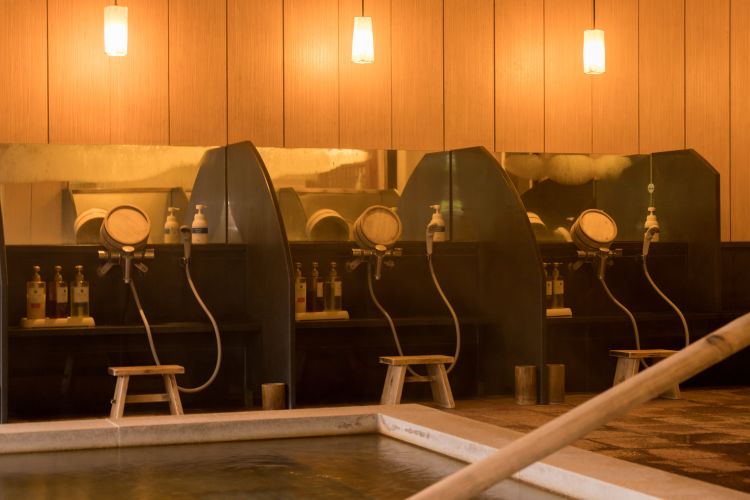
Even washing yourself at a Japanese onsen is relaxing. Sitting while washing is a calming, culturally rooted ritual of cleanliness and respect.
3. Wash thoroughly before entering the bath.
Cleanliness is essential. Before entering the bath, wash at one of the washing stations in the bathing area (you’ll see a bucket, a stool, often a hand-held shower, and amenities). Use the soap and shampoo and be sure to rinse off completely. Remove any makeup too. Before getting into the tub, it’s customary to pour hot water over your body—called kakeyu—to help you adjust to the temperature and prevent a sudden rise in blood pressure; many baths provide a dedicated basin near the entrance for this. The cleaner and more prepared you are, the more comfortable you will feel while bathing in the presence of others.
4. A few final tips
Speak softly in the changing and bathing areas, leave your phone outside the bathing area, check the onsen’s tattoo policies in advance (if needed), and avoid swimming or splashing in the water—onsen are places of peace and quiet. Don’t be overly concerned about following all the onsen norms and customs at first. Just review these guidelines, take a deep breath, and enjoy one of Japan’s most relaxing and restorative experiences.
FAQs
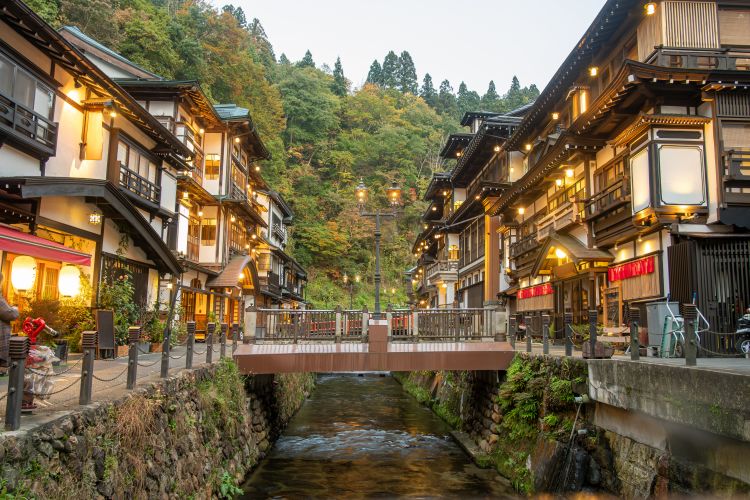
An onsen town like Ginzan in Yamagata Prefecture is ideal for an authentic onsen experience.
Where can I find onsen in Japan?
Onsen towns like Ginzan in Yamagata Prefecture and Hakone in Kanagawa Prefecture are built around natural hot springs and offer stays at traditional inns called ryokan, but you can also enjoy day-use baths in many cities. For more information you can start here , and if you want to get closer to nature, then consider a visit to an onsen within a national park .
Will I be accepted at an onsen if I have a tattoo?
Some traditional onsen may not accept people with a tattoo, but this is beginning to change! Look for tattoo-friendly facilities or book a private bath (kashikiriburo) where you can relax all by yourself. Social attitudes about tattoos are shifting very slowly, but the number of onsen that accept those with body art is increasing all the time!
Many onsen offer or sell small tattoo cover sheets for those with smaller pieces that can be easily concealed; however, these sheets are generally only suitable for very small tattoos.
What if I’m shy about undressing in front of others?
Changing rooms are always gender specific, as are the vast majority of onsen baths.
If you still feel shy, a private bath or a room with an attached open-air bath (rotenburo) is a great option.
I’ve already booked a hotel. Can I still bathe at an onsen ryokan?
Yes! Many facilities at onsen towns (such as Kusatsu in Gunma Prefecture ) specialize in day-use plans or drop-in access for bathing and don’t require an overnight stay. It’s a great way to experience an onsen for the first time.
Can I take my young children with me to an onsen?
Absolutely. Many onsen welcome families with children, but check the rules in advance. Some have family-friendly baths or offer private bathing for people with children.
How long should I soak in the bath?
That depends on the temperature of the water and your tolerance for heat, but avoid staying in too long. Just take it slow and pop out to get a drink of cool water if you feel too hot. Avoid drinking alcohol before taking a bath, because it can affect your judgment.
Do I need to rinse after the onsen?
Personal preference. Many people like to condition their skin by leaving the onsen water on their skin for as long as possible, however, others want to rinse their body one last time. In short, there is no correct bathing style, and you should enjoy finding out what works best for you!
Can I wear shoes at an onsen?
Guests or visitors are usually asked to remove their shoes at the entrance before entering the onsen facility, but in any event, be sure to remove your shoes or slippers before entering the changing room.
Is there a secure place to leave valuables?
Most onsen provide a locker or other secure place to store your valuables, often in the changing room. If you are staying overnight, you should lock valuables in your room safe.
Can I bring my phone or camera into the onsen?
Of course, many people want to get that perfect onsen photo and it can be tempting if there is nobody around. But no, in consideration of privacy, particularly of minors, it is absolutely forbidden!






















































